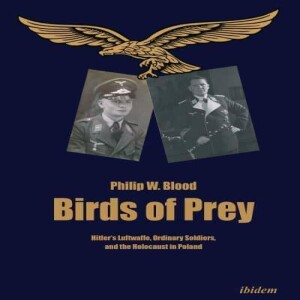
Parallax Views w/ J.G. Michael
Society & Culture

Birds of Prey: Hitler’s Luftwaffe, Ordinary Soldiers, and the Holocaust in Poland w/ Philip W. Blood
 2023-03-16
2023-03-16
On this edition of Parallax Views, independent military historian Philip W. Blood joins us to discuss his riveting micro-history of the violent Nazi occupation of Poland's Białowieźa Forest as detailed in his book Birds of Prey: Hitler's Luftwaffe, Ordinary Soldiers, and the Holocaust in Poland. In this tackling this microhistory Blood not only offers new insights into the nature of Germany security warfare, but also it relates to ideas about the mythology of the "Sacred Hunt" or "Code of the Hunt" in German culture. Moreover, Blood analyzes the Nazi activities in Białowieźa Forest in the context of the Third Reich's genocidal Holocaust to offer a fresh perspective on understand the atrocities of Hitler's German. In addition to all of this, he also reveals the shocking ways in which the German security warfare explored in Birds of Prey was utilized by the United States in the Korean and Vietnam wars.
In the course of our conversation Dr. Blood and I discuss:
- The way in which the Nazis essentially turned the Polish national park (Białowieźa Forest) into killing fields
- Comparing and contrasting Birds of Prey with Barbara Ehrenreich's Blood Rites: Origins and History of the Passions of War; the lack of an honor code in Białowieźa Forest and the killing of Jews, Soviet Partisan, Belarusians, and Poles in the forest
- How did ordinary soldier become cold-blood killers initiated into the "Code of the Hunt"
- The point at which the military history of WWII meets the Holocaust
- Settler-colonialism and the concept of Lebensraum
- How depictions of German WWII activities and the Holocaust as depicted in books, films, TV, and culture differ from and pale in comparison to the realities uncovered in Blood's research
- Blood's conversations with German WWII veterans; the harrowing nature of the violence and brutality of the German military during WWII
- The myths of military history; the phenomena of military rapes and violence against women by both Allied and Axis forces in WWII; the reality of war and the politics of violence underpinning wars
- Men as beast; the bestial nature of the violence that took place in the forest; Herman Goering, the Ogre of Rominten; Goering's beliefs about noble beasts
- German romanticism, irrationalism, the dehumanization of Jews as animals, and the logic of National Socialist ideology
- How the U.S. utilized the way German forces attacked the Soviet partisans in the Korea War and Vietnam War; U.S. protection of SS officials and U.S. studies of German records after WWII for utilization in wars; how the My Lai Massacre and the atrocities of war; figures into Blood's research; the ordinary soldier and the fight to survive
- The value of taking a microhistory approach to military history
- And more!
More Episodes
Create your
podcast in
minutes
- Full-featured podcast site
- Unlimited storage and bandwidth
- Comprehensive podcast stats
- Distribute to Apple Podcasts, Spotify, and more
- Make money with your podcast
It is Free
- Privacy Policy
- Cookie Policy
- Terms of Use
- Consent Preferences
- Copyright © 2015-2024 Podbean.com





